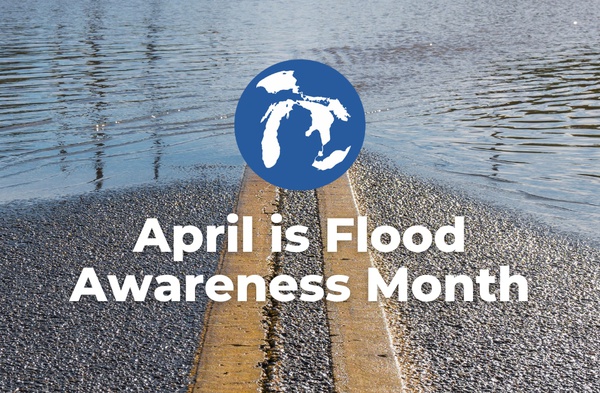Rising Waters: The Importance of Flood Insurance and Preparation
Posted:
2 years, 10 months
ago
April is Flood Awareness Month – a time to raise awareness of the risks of flooding and how to prepare for them. Floods can cause significant damage to homes and businesses, and it's important to be aware of the risks and take steps to protect yourself. In this blog post, we'll discuss the basics of floods, the importance of flood insurance, and how to prepare for and respond to a flood.

Understanding Floods
Floods are the most common and costly natural disaster in the United States, affecting people in all 50 states, according to a report by the Federal Emergency Management Agency (FEMA). In fact, floods cause billions of dollars in property damage and claim numerous lives each year.
Floods by definition occur when water overflows onto land that is usually dry. There are several different types of floods, including flash floods, river floods, and coastal floods. Flash floods happen quickly, often within minutes or hours, and are caused by heavy rainfall, dam failures, or sudden snowmelt. River floods occur over a longer period, often days or weeks, and are caused by prolonged heavy rainfall. Coastal floods are caused by high tides, storm surges, hurricanes, and tsunamis. Your risk varies depending on your location, or proximity to water, or can be left solely up to mother nature, which is why it's important to stay vigilant even in a low-risk areas.
 Insurance and Floods:
Insurance and Floods:
Put best by The Insurance Geek, "Identifying the cause and source of the water are the most important factors to determine if there is coverage for the damages." Generally, for homeowners insurance purposes, a flood is determined by water that has entered the home from the outside, such as heavy rains or coastal overflow. Commonly, resulting damages can look like
- Water damage to walls, floors, and ceilings
- Mold growth due to excess moisture if not properly remediated.
- Damage to electrical systems and appliances
- Structural damage to the foundation and walls
- Water damage to personal belongings, such as furniture and electronics
As you can imagine, the costs of repairing or replacing damaged and structures items can quickly add up. Without a separate flood insurance policy in place, you could be responsible for covering those costs yourself. It's important to assess your risk and consider purchasing flood insurance if you live in an area prone to flooding. Keep in mind that even if you don't live in a high-risk area, you could still experience flooding due to unexpected circumstances like heavy rainfall or shoreline flooding. It's smart to consult with an agent about if it makes sense to carry a flood policy on your property.
If it’s determined that you should purchase flood insurance, it's essential to read and understand your policy carefully to know what is and isn't covered. You should also take the time to review your coverage annually and make adjustments as necessary to ensure that you're fully protected.
Preparation and Remediation:
In addition to purchasing flood insurance, there are steps you can take to protect your home and belongings from flood damage. These include:
- Assessing your risk for floods. You can check your flood risk using FEMA's Flood Map Service Center.
- Create an emergency preparedness plan. This should include a plan for evacuation, a list of emergency contacts, and a plan for communicating with family members.
- Prepare your home or business when the forecast calls for disaster. This may include installing flood barriers or sandbags, elevating appliances, and electronics off the floor, and making sure gutters and downspouts are clear.
- Pack an emergency kit. Be sure to include food, water, medication, first aid supplies, and other essential items.
- Keep gutters and downspouts clear. This can help prevent water from backing up and causing damage to your roof or foundation.
- Install backflow valves to prevent sewage backup in the event of a flood.
Even if you take all of these steps to prepare, disaster can still strike. What happens if it does? The first step is to stay safe and follow any evacuation orders from local authorities. Once the floodwaters have receded and it's safe to return, the focus turns to remediation - the process of cleaning up and repairing damage to your home or business.
Remediation can be a complex and time-consuming process, but it's essential to ensure that your property is safe and won’t incur any further damages. The following steps can help guide you through the remediation process:
- Document the damage. Take photos and videos of the damage to your property before you begin any cleanup efforts. This documentation can be crucial when filing insurance claims.
- Remove the water. Depending on the severity of the flood, you may need to hire a professional water removal company to pump out the water from your property.
- Dry out the affected areas. Once the water has been removed, it's important to thoroughly dry out the affected areas to prevent mold growth and further damage.
- Clean and disinfect. All affected surfaces and items should be cleaned and disinfected to remove any bacteria, viruses, or other harmful substances that may have been carried in by the floodwaters.
- Repair and replace damaged items. This may include replacing drywall, flooring, and other building materials that have been damaged.
In the aftermath of a flood, it's important to take things one step at a time and to seek help if needed. There are many resources available to help you navigate the remediation process, including FEMA, local disaster relief organizations, and professional remediation companies.
In Conclusion:
In conclusion, flooding is a serious threat that can cause devastating damage to your property and belongings. While taking preventative measures can help mitigate the risk of flood damage, it's impossible to eliminate the possibility of disaster. That's why it's important to speak with an insurance agent to determine your level of risk and ensure that you have adequate coverage in place.
Don't wait until it's too late to protect your home and belongings from flood damage. Take action today by contacting an insurance agent to discuss your options for flood insurance. With the right coverage in place, you can have peace of mind knowing that you're prepared for whatever may come your way. We are happy to help you determine if flood insurance is right for your property.
More Industry News

Want to stay up to date on the latest community and insurance news? You can find more on important topics on our blog.
About Top O' Michigan Insurance Solutions:
At Top O’ Michigan Insurance Solutions, we pride ourselves on using our skills to provide clients with competitive pricing, stability and understanding, and peace of mind. With seven locations throughout Michigan and 24/7 client access, our team is your 'expert buyer' of insurance for home, auto, farm, boat, motorcycle, business owners, workers compensation, bonds, life and health, employee benefits and more.
We will provide unparalleled and caring service to our clients through our knowledgeable staff and give back to our employees, agency, industry and our communities. Part of our mission is to give back to the Michigan communities we serve. This is something we take action on through We Care and you can learn more about our community outreach at TOMIA247.com/WeCare.
National Resources, Locally Sourced.
Disclaimer: This Blog/Web Site does not provide insurance or legal advice. This site is for educational purposes only as well as to provide you with general information and a general understanding of insurance, not to provide specific legal advice or specific contract advice. Viewing this site, receipt of information contained on this site, or the transmission of information from or to this site does not constitute a client relationship.
The information on this Blog/Web Site is not intended to be a substitute for professional insurance or legal advice. Always seek the advice of a licensed agent in your state pertaining to insurance and legal issues.
Author: Kimberly Berreth
Sources:
- Federal Emergency Management Agency (FEMA). (2020). Floods. Retrieved from https://www.fema.gov/disaster/4086
- Insurance Information Institute. (2021). Flood insurance. Retrieved from https://www.iii.org/article/flood-insurance
- The Insurance Geek. (2021). The slippery scenarios of water damage and insurance. Retrieved from https://theinsurancegeek.com/blog/f/the-slippery-scenarios-of-water-damage-and-insurance
- National Flood Insurance Program. (2021). Flood insurance basics. Retrieved from https://www.floodsmart.gov/flood-insurance-basics
- American Red Cross. (2021). Flood safety. Retrieved from https://www.redcross.org/get-help/how-to-prepare-for-emergencies/types-of-emergencies/flood.html
Share on Facebook

